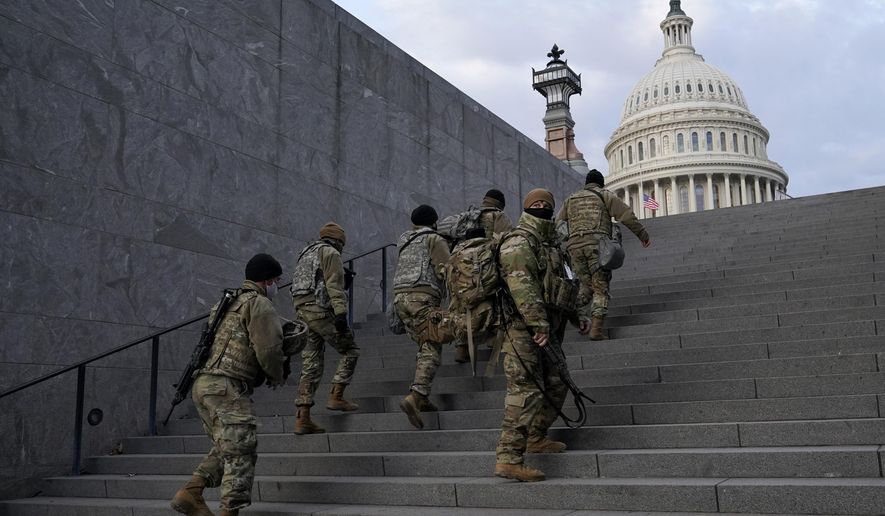Veterans are generally less likely than American civilians to support radical ideologies or back extremist groups such as antifa or White supremacist outfits, according to a new survey, casting doubt on the narrative that the military is a breeding ground for extremists.
The study from the RAND Corp. surveyed nearly 1,000 veterans late last year. The report’s release comes amid a concerted push inside the Pentagon to identify and weed out potential extremists in the ranks, an effort that began in earnest after the Jan. 6, 2021, protest at the U.S. Capitol. Dozens of veterans and several active-duty troops allegedly took part that day, fueling fears that right-wing political violence could emanate from within the armed forces and threaten the stability of the country.
The RAND report suggests that isn’t true.
“There was no evidence to support the notion that the veteran community, as a whole, manifests higher rates of support for violent extremist groups or extremist beliefs than the American public,” the study’s authors wrote in a summary of their findings.
The report sought to answer a key question at the heart of the matter: Are veterans, with their military training and familiarity with firearms, more willing to seek friendship and support from extremist groups than American civilians? That notion has taken hold in the media and some left-leaning political circles, but RAND researchers suggested there’s no clear data to back it up.
“Extremist groups can provide a new and supportive social network, and their shared mission can provide a new sense of purpose that can fill in gaps left in the lives of those who no longer experience the sense of meaning and belonging provided by military service,” the study reads. “Despite such rising concern, little empirical research into the prevalence of support for violent extremism among veteran communities exists. While numerous surveys have sought to measure the prevalence rates of support for violent extremist movements and ideologies, no such study has examined such attitudes in a representative population of veterans.”
In virtually all specific instances, the RAND research indicates that veteran support for extremist causes across the political spectrum is below the levels seen among the general population.
For example, 5.5% of veterans said they hold a “very or somewhat favorable” opinion of left-wing antifa. Among the American public, that figure is 10%, the report found, citing previous representative surveys of the population at large.
Just over 4% of veterans surveyed said they have a very or somewhat favorable opinion of the Proud Boys group. Among the public, the figure is 9%. Several high-profile leaders of that organization have been convicted of felonies in connection with the Jan. 6 protest.
Just 0.8% of veterans had a very or somewhat favorable attitude toward White supremacists. Among the general public, the figure is 7%, the study found.
Veterans were asked whether the nation is so far off track that “true American patriots may have to resort to violence in order to save the country.”
Just under 18% of veterans said they “completely or mostly agree” with that sentiment compared with 19% of the general public.
About 13.5% of veterans expressed some solidarity with the beliefs espoused by the group QAnon compared with 17% of the general population.
RAND researchers said some of the veterans interviewed may be at risk for recruitment by extremist groups.
“The majority of veterans who support the need for political violence in the abstract are not supportive of any of the four extremist groups we studied,” the study reads. “There may thus be many veterans who have the potential to be recruited by extremist groups (via their willingness to endorse political violence) but who are not currently supportive of a specific group.”
The Pentagon’s anti-extremist push began weeks after President Biden and Defense Secretary Lloyd Austin took office. Mr. Austin ordered all service members to spend a day discussing hateful ideologies, bigotry, discrimination and related issues.
The campaign against far-right extremism and ultranationalism in the ranks turned up just a minuscule number of cases, and critics say the focus on social issues takes away from the overriding priority of molding an effective fighting force to defend the country. Republicans say it’s an example of the Pentagon’s focus on a woke agenda, where issues such as gender identity and political ideologies are prioritized over lethality and military preparedness. Defense officials reject those charges.
Within military circles, the Jan. 6 protest has become part of the debate. In testimony before Congress in June 2021, Army Gen. Mark A. Milley, chairman of the Joint Chiefs of Staff, suggested racism was a factor in the march on the Capitol by supporters of President Donald Trump — many of whom were military veterans protesting what they saw as a rigged presidential election.
“I want to understand White rage, and I’m White,” he said on June 23, 2021.
The general faced stiff criticism for seemingly implying a direct racial connection to the events of Jan. 6. A month after his comments, he promised to address the topic more fully at a later date.
• Ben Wolfgang can be reached at bwolfgang@washingtontimes.com.




Please read our comment policy before commenting.